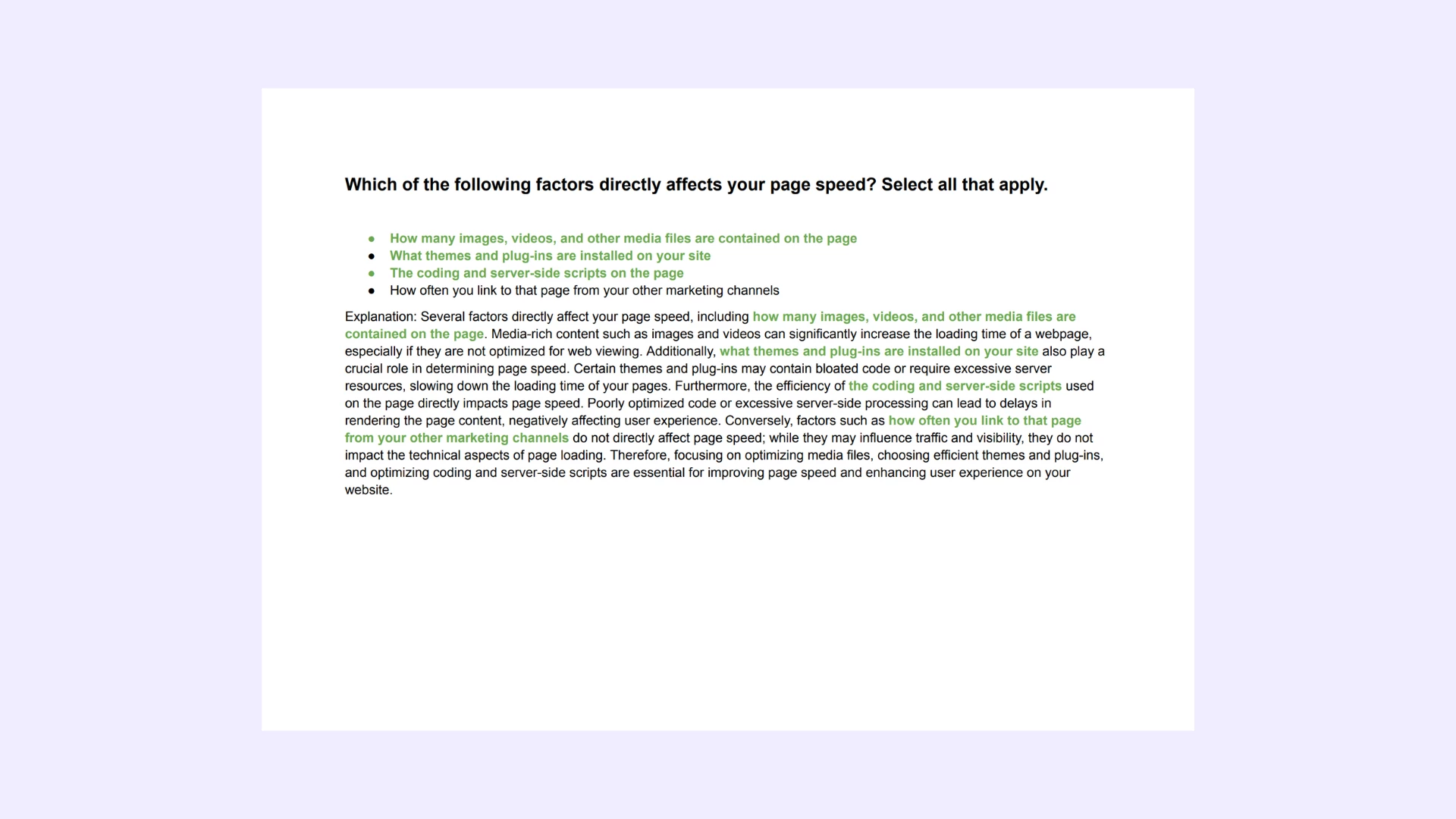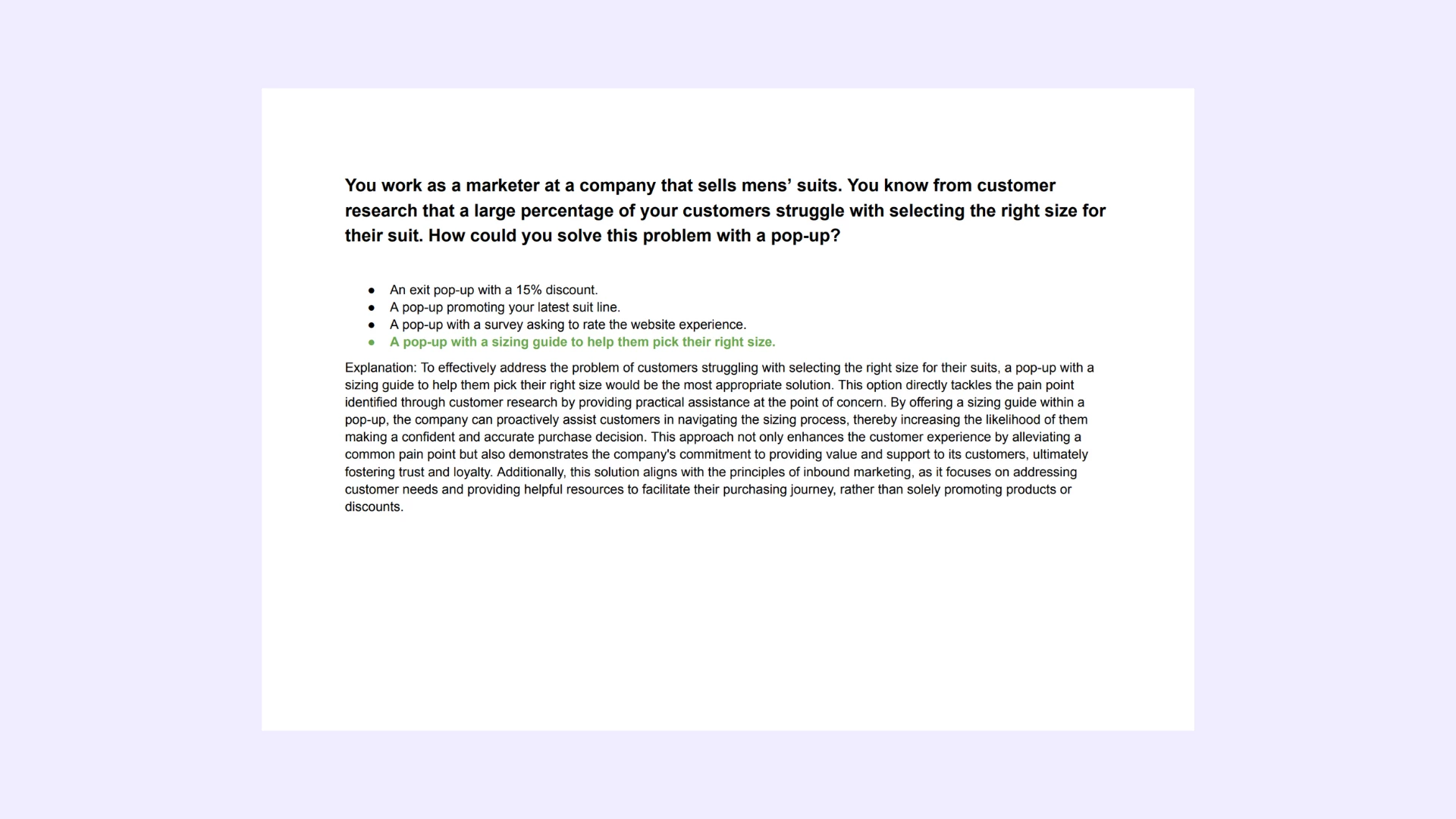Which of the following is NOT a function of the robots.txt file?
Show search engine bots all the pages on a site
Prevent search engines from crawling private pages
Keep search engine bots from overwhelming server resources
Specify the location of your sitemap

HubSpot Roll. Includes Answers for Every Real HubSpot Certification Exam.
All-in-One: Get all HubSpot exams answers with explanations in one bundle. This package includes answers for every current HubSpot certification. Regular updates to reflect the latest exam version. -> See what's included.


Need a single cerification exam answers? Check out our -> list of certification exams answer keys. Learn Smarter. Obtain or Renew your certificates with peace of mind!
Explanation: Which of the following is NOT a function of the robots.txt file?
Explanation: The function of the robots.txt file is to control how search engine bots access and crawl a website's pages, making the statement "Show search engine bots all the pages on a site" incorrect. The robots.txt file does not instruct search engine bots to display all pages on a site but rather provides directives to specify which pages or sections should be crawled and indexed and which ones should be excluded. Preventing search engines from crawling private pages, keeping search engine bots from overwhelming server resources, and specifying the location of your sitemap are all legitimate functions of the robots.txt file. By disallowing access to private pages, website owners can protect sensitive information from being indexed by search engines. Additionally, managing server resources by limiting bot access helps maintain website performance and prevents potential server overload issues. Furthermore, specifying the location of the sitemap in the robots.txt file helps search engine bots efficiently discover and crawl the website's pages, improving overall indexing and visibility in search engine results. Therefore, the correct answer is "Show search engine bots all the pages on a site."

Special Bundle Offer HubSpot Roll. All in One
Note: We conduct daily checks for updates on the exam, ensuring that the file contains the most recent questions from the actual certification program.
Questions | Answers | Explanations. FREE Updates.
You may also be interested:
- Special HubSpot bundle offer - all HubSpot exams in one
- HubSpot CMS for develpers certification exam answers
- HubSpot CMS for develpers II certification exam answers
- HubSpot content hub for marketers certification exam answers
- HubSpot content marketing certification exam answers
- HubSpot contextual marketing certification exam answers
- HubSpot digital advertising certification exam answers
- HubSpot digital marketing certification exam answers
- HubSpot email marketing certification exam answers
- HubSpot frictionless sales certification exam answers
- HubSpot growth driven design certification exam answers
- HubSpot inbound certification exam answers
- HubSpot inbound marketing certification exam answers
- HubSpot inbound marketing optimization certification exam answers
- HubSpot inbound sales certification exam answers
- HubSpot integrating with HubSpot I foundations certification exam answers
- HubSpot marketing hub software certification exam answers
- HubSpot reporting certification exam answers
- HubSpot revenue operations certification exam answers
- HubSpot sales enablement certification exam answers
- HubSpot sales hub software certification exam answers
- HubSpot sales management certification exam answers
- HubSpot sales software certification exam answers
- HubSpot seo certification exam answers
- HubSpot seo II certification exam answers
- HubSpot service hub software certification exam answers
- HubSpot social media marketing certification exam answers
- HubSpot social media marketing II certification exam answers